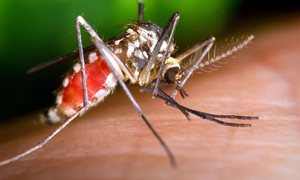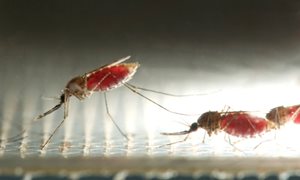
In their latest publication in Nucleic Acids Research, Joep Joosten, Gijs Overheul, Ronald van Rij and Pascal Miesen, theme infectious diseases and global health, discover an intriguing interaction of a specific class of non-coding RNAs, called piRNAs, and viral RNA sequences in Aedes aegypti mosquitoes.
In their latest publication, Arthropod-borne viruses (arboviruses) including Dengue, Zika and Yellow fever virus are transmitted by Aedes aegypti mosquitoes. Yet, it is still poorly understood how the mosquito immune system controls virus infection and thereby affects virus transmission. An intriguing hypothesis in the field is that, similar to the antiviral CRISPR system in bacteria, endogenous viral sequences encoded in mosquito genomes give rise to small RNAs, so called piRNAs, that can induce degradation of viral RNA.
In their latest publication Joep Joosten and colleagues demonstrate that piRNAs derived from endogenous sources indeed target cognate viral sequences and they furthermore define the molecular machinery required for this activity. Along with several other recent publications by the group and other laboratories, these findings challenge the dogmatic view that the immune systems of insects are devoid of a heritable component. These discoveries have important implications for our understanding of mosquito immunity and virus transmission.
Related news items

Grants for research on magnesium deficiency and malaria Vidis for Felix Hol and Jeroen de Baaij
1 July 2022 Radboudumc researchers Jeroen de Baaij and Felix Hol both receive an NWO Vidi grant for their research, respectively on magnesium deficiency in type 2 diabetes and on malaria. go to page
Field research on malaria vaccine offers unexpected surprise
23 May 2022Field research on the effectiveness of a malaria vaccine, came up with unexpected results for an international group of researchers including Benjamin Mordmüller of Radboudumc. The vaccine evokes a broader response against malaria proteins than there are in the vaccine.
go to page
Rubicon grants awarded to three RIMLS researchers
19 April 2022Three researchers have received Rubicon funding from NWO/ZonMw. This will enable Elke Muntjewerff, Laura de Vries and Laurens van de Wiel to do research at a foreign research institute for the next two years.
go to page


